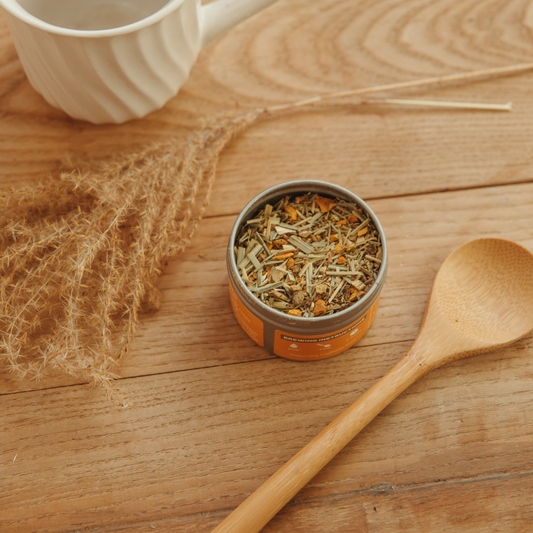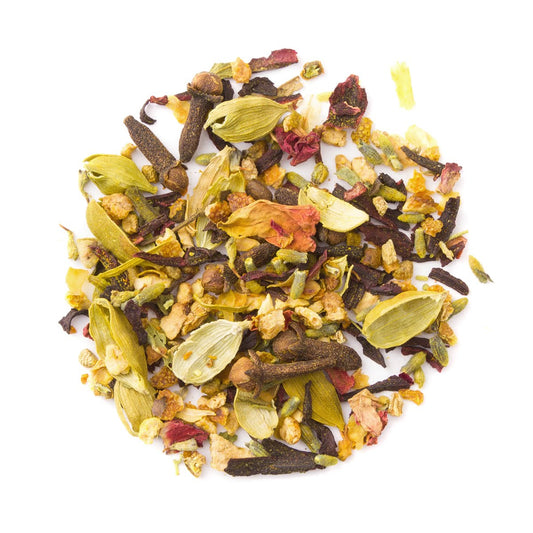Looking to add some brightness to your day (your week, your month or even your year)? There’s truly no replacement for a good old-fashioned kick of citrus. Be it classic orange (or the peel, lending a unique bitterness), sweet mandarin, luscious lemon, balanced lime, earthy bergamot, tangy tangerine or any other variant, having citrus as a main ingredient in your loose-leaf routine is always a win—especially when, like now, we’re feeling the summer approach.
What Makes it Citrus?
To start, let’s backtrack. What makes a citrus fruit a citrus fruit? Belonging to the bitter-leaning Rue family of plants, citruses, known as Rutuceae, are a family of pulpy, thick-skinned fruits, all with a flavor profile that lands somewhere in the sour/tart/bitter/sweet/bright range. Citruses are as brightly colored as they are flavored (lemon yellow, anyone?) and typically grow in subtropical regions around the world, where their refreshing nature is a match for the heat.
In terms of taste, citrus is acid-heavy, making it a central focus in many cuisines around the world. Many of our favorite cuisines lean into the broad use of acid, a category which extends as far as tomatoes and olives. More specifically, South East Asian, Middle Eastern, Caribbean and Latino foods all make heavy use of citrus fruits, including the juice, and rind and pith, in all forms, including fresh, dried and preserved—not to mention extracting oils and essences. Cultures from Mexico to Morocco even use orange blossom water as a potent perfume. Iranian-American chef Samin Nosrat names acid in general as one of four essential components to tasty food in her seminal cookbook, Salt Fat Acid Heat, in which she emphasizes acid as a key element of satiety that is lacking in foods we consider dull.
Health Benefits of Citrus
But the pluses of consuming citrus go beyond just its zesty taste and fragrance. When it comes to health and a wholesome lifestyle, consuming citrus is an essential component. These sweet-and-sour fruits offer vitamins C, B, phosphorus, magnesium, potassium and more, creating a powerhouse of antioxidant and anti-inflammatory effects. They are also known to support heart, kidney, eye, and brain health thanks to flavonoids and other compounds.
Citrus Focused Teas
In the world of gourmet teas, it’s no wonder that Heavenly Tea Leaves has incorporated tangy citrus into a variety of blends. Organic Turmeric Ginger, for example, counts pleasantly tart tangerine among its ingredients. The oil or flavor of the bergamot fruit is combined with black tea to create the timeless Earl Grey flavor. Simple Lemon Black converges the best of both worlds in tea terms—and although plants like lemon myrtle and lemongrass are not in the citrus family, they do lend a similar intoxicating aroma, enhancing the lemon vibe even further. Digestion, a floral-minty-spicy blend, is another solid choice in the world of organic teas; it features both lemon and lime oils that nicely round out the medley.
As a bonus, drinking teas with citrus can also help to kick your sugar habit, as we’ve noted before—the natural sweetness lent by these fruits is often enough to scratch the itch of a sweet tooth. Keeping an open mind about how to get that ever-important vitamin C intake? In addition to these teas, you can squeeze fresh lemon into your favorite plain black or green tea for the perfect contrast.
The question remains…which organic citrus-focused tea will be ushering your taste buds into the summer? Browse them all at Heavenly Tea Leaves…and no need to pick just one.





